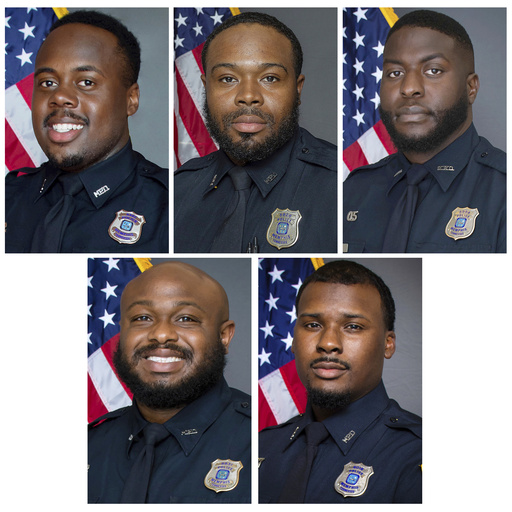MEMPHIS, Tenn. (AP) — Five former Memphis police officers were charged Tuesday with federal civil rights violations in the beating death of Tyre Nichols as they continue to fight second-degree murder charges in state courts arising from the killing.
Tadarrius Bean, Desmond Mills, Demetrius Haley, Emmitt Martin and Justin Smith were indicted in U.S. District Court in Memphis. The four-count indictment charges each of them with deprivation of rights under the color of law through excessive force and failure to intervene, and through deliberate indifference; conspiracy to witness tampering, and obstruction of justice through witness tampering.
The new charges come nine months after the violent beating of Nichols by police officers during a Jan. 7 traffic stop near his Memphis home. Nichols died at a hospital three days later, and the five officers have pleaded not guilty to state charges of second-degree murder and other alleged offenses in the case. The five former officers charged are Black, like Nichols.
“We all heard Mr. Nichols cry out for his mother and say ‘I’m just trying to go home,’” Attorney General Merrick Garland said in a video statement after the indictment. “Tyre Nichols should be alive today.”
Caught on police video, the beating of the 29-year-old Nichols was one in a string of violent encounters between police and Black people that sparked protests and renewed debate about police brutality and police reform in the U.S.
Blake Ballin, an attorney representing Mills on the state criminal charges, said the federal indictment “is not unexpected” and Mills will defend himself against the federal charges as he is in state court.
Martin’s attorney, William Massey, said the federal charges were expected. “They are not a surprise,” he said in a text message.
Martin Zummach, the attorney for Smith on the state charges, declined comment, while attorneys for the other former offices have not responded to requests for comment.
The indictment says the officers failed to tell dispatchers, their supervisor and emergency medical technicians that they knew Nichols had been hit repeatedly in an attempt to cover up their use of force and shield themselves from criminal liability.
Additionally, the indictment alleges instances where the officers used their body cameras to limit what evidence could be captured at the scene: Martin moved his body camera to a place where it wouldn’t show video of the beating; Haley and Smith activated theirs only after the assault; Haley and Mills took theirs off when emergency medical personnel were on the scene, before the officers gathered to talk among themselves about the force they used on Nichols.
At the arrest scene, the officers discussed hitting Nichols with “straight haymakers,” even as Nichols’ condition deteriorated and he became unresponsive, the indictment said. Nichols could be seen on police video on the ground, slumped against a police car.
The indictment accuses the officers of gathering after the beating and saying, among other things, that “I thought when he wasn’t going to fall, we about to kill this man.” The indictment does not specify which officer made that statement.
The indictment also alleges that the officers falsely stated that he actively resisted arrest at the scene of the beating and that he that he grabbed on Smith’s protective vest and pulled on the officers’ duty belts.
A hearing was set for Friday morning in a federal lawsuit filed by Nichols’ mother against the five officers, the city of Memphis and its police department. The officers then are scheduled to appear in state court Friday afternoon.
The Justice Department announced an investigation in July into how Memphis Police Department officers use force and conduct arrests, one of several “patterns and practices” investigations it has undertaken in other U.S. cities.
In March, the Justice Department said it was conducting a separate review concerning use of force, de-escalation strategies and specialized units in the Memphis Police Department.
The officers were part of a crime-suppression team known as Scorpion. They punched Nichols, kicked him and slugged him with a baton as he yelled for his mother, authorities and video showed. Officials disbanded the Scorpion unit after Nichols’ death, though members of the unit have been moved to other teams.
The Memphis City Council subsequently passed an ordinance that outlawed so-called pretextual traffic stops, which include minor violations such as a broken tail light. But some activists have complained that the ordinance has not been consistently enforced.
Elsewhere, a federal civil rights case was filed last year against four Louisville, Kentucky, police officers over a drug raid that led to the death of Breonna Taylor, a Black woman whose fatal shooting helped fuel racial justice protests that swept the nation in 2020. In Minneapolis, former police officers were convicted of violating the civil rights of George Floyd, whose death sparked those protests. Former officer Derek Chauvin was sentenced to 21 years after pinning Floyd to the pavement for more than nine minutes as the Black man pleaded, “I can’t breathe.”
___
Mattise reported from Nashville, Tennessee. Lindsay Whitehurst contributed from Washington.
Source: post





